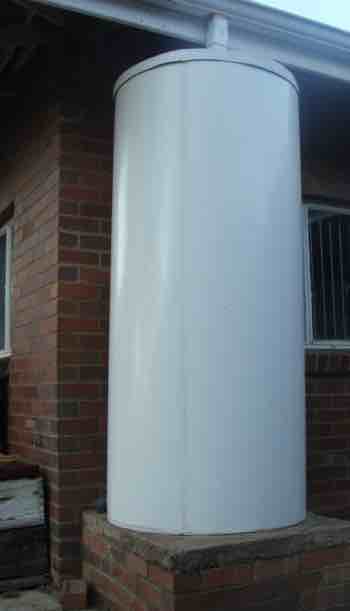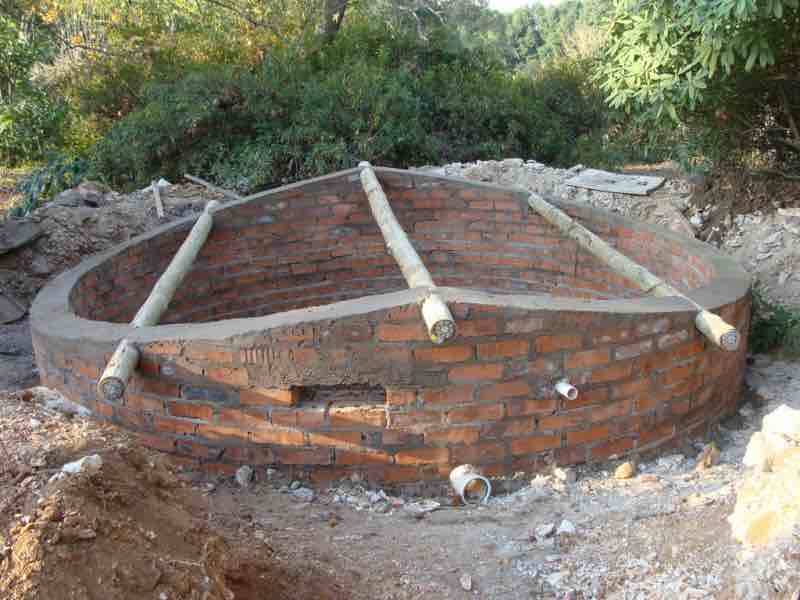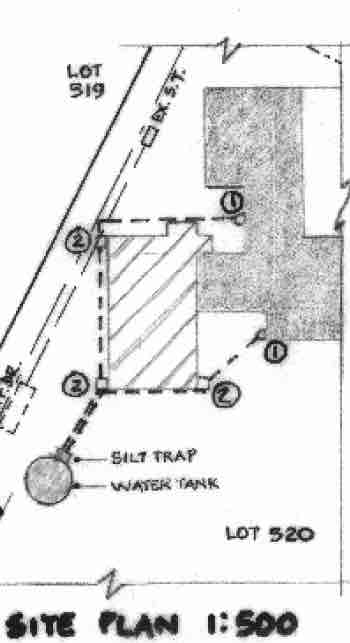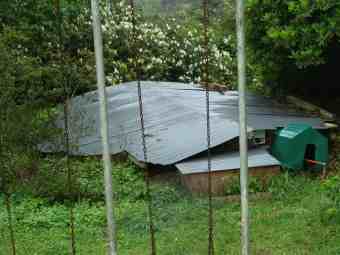- Homepage
- Our green garden
- Where Is Our Water
Where is our water?
Where is our water is a cry heard increasingly around South Africa.
Last week the people of Mpophomeni in their frustration marched on the ANC's municipal offices in Howick, South Africa. With large parts of the town already plumbed and being used to piped water they are rightly frustrated; especially with Midmar Dam overflowing on their doorstep. The taps in the local school and much of the village are bone-dry.

The great bamboozle
There is a perception in South Africa that we live in a water-scarce country and because of climate change we simply have to accept that grave shortages will in the future be the new normal.
The truth is though that even in very dry areas more water falls from the sky on every village, town and city than is used in its reticulation[1]. So bamboozled are we that we cannot perceive that this rain could realistically be harvested and stored locally for when it is needed.
“One of the saddest lessons of history is this. If we have been bamboozled long enough, we tend to reject any evidence to the contrary. We are no longer interested in finding out the truth. The big fat lie has captured us. It is simply too painful to acknowledge, even to ourselves that we have been so credulous. So the old deceptions tend to persist as the new ones rise.”
- Carl Sagan
South Africa has more than enough water for urban-dwellers without the building of massively expensive dams and costly reticulation. For agriculture and industry it's another story.
The Irish wag, Oscar Wilde, once wrote that the only problem with progress is that it goes forwards instead of to the rear; water has been stored in cisterns of one sort or another for millennia. He has got a point, though not many of us would give up on our new toys.
In similar vein to the cry for water, where is our electricity is being shouted from the rooftops; that too falls on deaf ears.
The answer to these thorny questions, of course, is that the rain and sunshine are falling like manna from heaven; all we have to do is collect and store them. But instead we let the water run away into the ground, wasted. Only eight percent would apparently reach some river and possibly eventually be dammed.
In just one month
Enough water descends on every roof during the rainy season to supply the home for a whole year. A hundred cubes falls on a small house and 500 on a larger dwelling; both would be ample for the poor and rich inhabitants alike. Gutters, a few large tanks and more importantly a change of attitude are all that are needed.
Water scarcity in the world is a reality in many places but more often than not there is more than enough if we simply started to harvest and plant the rain, as Brad Lancaster says. See his truly amazing TED talk[1] below.
“We cannot afford to differ on the question of honesty if we expect our republic permanently to endure. Honesty is not so much a credit as an absolute prerequisite to efficient service to the public.
Unless a man is honest, we have no right to keep him in public life; it matters not how brilliant his capacity.”
- Theodore Roosevelt
The state must supply me with my needs must change to I will make my home resilient and provide for my own requirements. As far as water is concerned, the cost of collection and storage at home are not a massive investment.
Disturbingly the memo given to the authorities in Howick contained an emphatic rejection of plastic containers. Perhaps what was meant was contempt for the unreliable tankers delivering water to the street; that I can agree with.
Just as important as the water itself is, let us not forget to reflect on the quality; that has certainly regressed too.
Really I would like to rephrase the question. Where is our clean water?
Recent research indicates that we swallow about 5g of plastic per week, the size of a credit card mainly from our municipal and bottled drinking-water.
And secondly medication is finding its way into our water from sewage; it is making the pathogens that kill hundreds of thousands of people resistant to antibiotics.
Researchers have found up to 300
times the safe amount of medication, whatever that it, in our drinking water. Is it any wonder we are increasingly sickly.
"Enhancing water security protects society and sectors from specific water risks, and can have a profound positive effect on economic growth, inclusiveness and the structure of economies”.
-OECD
Harvesting and storing the rain does have a few perils of its own, but nothing when compared to no water at all, or the plastic and antibiotic residues in the municipal and bottled stuff. Very toxic chlorine and fluoride and their inter-reaction with organic material also come into the equation[2].
An underground reservoir, properly built and plastered, is both far cheaper than tanks and safer because the water is kept extremely cold even in midsummer.

I know for a fact that the people of Mpophomeni have the skills to dig a large hole and brick up a reservoir. Who will be the first?
Provision of quality water is failing world-wide and clearly our municipalities in South Africa simply do not have the wherewithal to provide new reticulation particularly to communities whom they suspect will not pay for it. Be glad if you have water at any pressure coming out of your tap but if you consider it is pristine, think again.
So what are the causes of water scarcity in our world?
Harvesting your own rainwater is a lot simpler than you may think and the cost will be recouped with a few short years; more important it will be far cleaner than what you are now drinking. Just as significant, what's potting in the winter garden will reach new heights.

You will need to have plans drawn up if you live in an urban area. This is my water innovation idea; what is yours?
This is a truly wonderful and inspiring TED talk by Brad Lancaster[1].
When browsing use right click and "Open Link in New Tab" or you may get a bad gateway signal.
Where is our water?
Where is our water really should be rephrased to where is the clean stuff, devoid not just of pathogens but also with no plastic particles or other toxic chemicals.
Water scarcity in our world is not going to be solved without our involvement.

We consider ourselves lucky not to have a gardener; we have no hesitation about carrying buckets of water from the laundry to our veggie garden.
Handwashing helps stop the spread of viruses
With many homes in South Africa like those in Mpophomeni having no running water in which to wash hands for twenty seconds several times a day, the basics of prevention of coronavirus-19 are well nigh impossible. Especially when people have to crowd around a communal tap.
The recommendation is to wash our hands with soap, and rinsing them in running water, after visiting public places; or coughing and sneezing. And of course after visiting the loo and before eating we should be equally thorough; and after blowing our noses.
That can readily be ten times a day, each requiring about two litres.
The thought of a family of five requiring 100 litres of water just for washing their hands is patently absurd if you are unable to store the rain, or have to wait for the unreliable tankers. Of course it could be reused to flush the toilets or irrigate the garden.
It all depends on how much water you can store in your home.
With inadequate supplies of clean water being the single greatest cause of child mortality from diarrhoea in many countries, thoughts of storage of the rain in the garden adjacent to our homes needs to be central. It is no coincidence that those areas with a poor culture of washing hands are the most affected by viruses in general.
This bug has created an unexpected benefit, spurring us on to harvest and store the rain in our own homes. Then we could have plenty of clean water not only to drink and wash our hands but also to shower and irrigate our gardens.
My own journey with the threat of the virus has nothing to do with fear but has spurred me on to greater efforts at cleanliness.
Europe, China and the USA
It's not only in Africa that the people are crying out, where is our water? Europe, China and the USA are also in the grip of droughts.
"We have now had consecutive droughts for the last five years, and 2022 is the worst Europe-wide drought in centuries."
- says Dr Fred Hattermann, of the Potsdam Institute for Climate Impact Research.
Harvesting and storing rainwater has become the great imperative; and it's best done on-site.
The material expressed on this page is gleaned from the nutritional and environmental literature; it is clearly referenced. A plain distinction is made between the author's opinion and that which is scientifically proven. When in doubt consult your health professional.
To suggest a correction or clarification, write to Dr Bernard Preston here. Contact.
Newsletter
Our newsletter is entitled "create a cyan zone" at your home, preserving both yourself and Mother Earth for future generations; and the family too, of course. We promise not to spam you with daily emails promoting various products. You may get an occasional nudge to buy one of my books.
Here are the back issues.
- Lifestyle and ideal body weight
- What are ultra-processed foods?
- Investing in long-term health
- Diseases from plastic exposure
- Intensive lifestyle management for obesity has limited value
- A world largely devoid of Parkinson's Disease
- The impact of friendly bacteria in the tum on the prevention of cancer
- There's a hole in the bucket
- Everyone is talking about weight loss drugs
- Pull the sweet tooth
- If you suffer from heartburn plant a susu
- Refined maize meal and stunting
- Should agriculture and industry get priority for water and electricity?
- Nature is calling
- Mill your own flour
- Bake your own sourdough bread
- Microplastics from our water
- Alternative types of water storage
- Wear your clothes out
- Comfort foods
- Create a bee-friendly environment
- Go to bed slightly hungry
- Keep bees
- Blue zone folk are religious
- Reduce plastic waste
- Family is important
- What can go in compost?
- Grow broad beans for longevity
- Harvest and store sunshine
- Blue zone exercise
- Harvest and store your rainwater
- Create a cyan zone at your home
Did you find this page interesting? How about forwarding it to a friendly book or food junkie? Better still, a social media tick would help.
- Homepage
- Our green garden
- Where Is Our Water
Address:
56 Groenekloof Rd,
Hilton, KZN
South Africa
Website:
https://www.bernard-preston.com